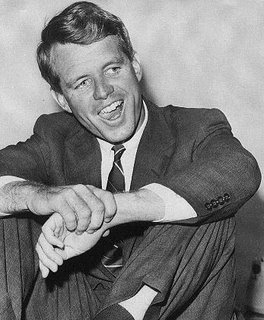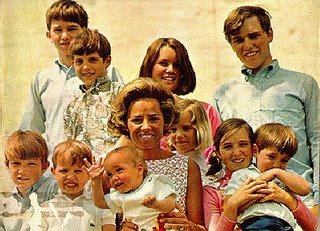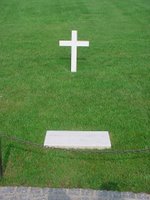
born Nov. 20, 1925
died June 6, 1968
Murdered at age 43, leaving a pregnant wife and 10 other young children

Full article--U.S. attorney general and adviser during the administration of his brother Pres. John F. Kennedy (1961–63). Later U.S. senator (1965–68), he was assassinated while campaigning for the presidential nomination.
Robert interrupted his studies at Harvard University to serve in the U.S. Navy during World War II but returned to the university and was graduated in 1948. After receiving his law degree from the University of Virginia Law School in 1951, he began his political career in Massachusetts the next year with the management of his brother John's successful campaign for the U.S. Senate.
In 1957 he was chief counsel to the Senate select committee conducting investigations into labour racketeering, which led to his long-standing feud with James R. Hoffa of the Teamsters Union. Kennedy resigned from the committee staff in 1960 to conduct his brother's campaign for the U.S. presidency and was subsequently appointed (1961) attorney general in the Cabinet of Pres. John F. Kennedy.
On Nov. 22, 1963, the President was assassinated in Dallas, Texas. Robert Kennedy continued to serve as attorney general until he resigned in September 1964. The months after his brother's death were a desperate time for him. He was stooped by grief and spent long periods staring out windows or walking in the Virginia woods.
Learning on May 20, 1961, that a hostile mob threatened the civil rights leader Martin Luther King, Jr., and about 1,200 of his supporters in Montgomery, Ala., Attorney General Kennedy sent 400 federal marshals to protect them. In subsequent racial crises he used long telephone sessions to work out the strategies of peace officers in the South. He also led a tough and imaginative drive against organized crime.
One of his proudest achievements was assembling the evidence that convicted Hoffa. On Robert Kennedy's departure from the Department of Justice The New York Times, which had criticized his appointment three years earlier, said editorially, “He named excellent men to most key posts, put new vigor into protecting civil rights through administrative action, played a pivotal role in shaping the most comprehensive civil rights law in this country. . . . Mr. Kennedy has done much to elevate the standard.”
On March 16, 1968, he announced his candidacy for the presidency. By June 4 he had won five out of six presidential primaries, including one that day in California. Shortly after midnight on June 5 he spoke to his followers in Los Angeles' Ambassador Hotel. As he left through a kitchen hallway he was fatally wounded by a Palestinian immigrant, Sirhan Bishara Sirhan. Robert Kennedy was buried near his brother at Arlington National Cemetery.





1 comment:
Thank you Michelle,for remembering a great man.
Post a Comment